Topics
Category
Era
Miracle on Ice
The Miracle on Ice is the name given to the American men’s ice hockey victory over the heavily favored Soviet Union at the 1980 Winter Olympics. The team drew heavily on Minnesotan talent, including twelve players and coach Herb Brooks. Coming amid American setbacks in the Cold War, their unlikely win inspired and united the country.
St. Paul native Herb Brooks was head hockey coach for the University of Minnesota from 1972 to 1979. After being picked to lead the U.S. to the 1980 Olympics in Lake Placid, New York, he selected much of his team from Minnesota, a state known for its hockey programs. Nine members had played for Brooks’s Golden Gophers, who had won three national titles in six years.
Brooks used a European-style game of speed and passing. He emphasized teamwork, effort, and character in his players. To unite players from rival schools, he made himself a focal point for their frustrations by pushing their limits and criticizing them often. The team had forty-two wins, sixteen losses, and two ties against college, National Hockey League (NHL), and European teams in exhibition play.
Just months into the Iranian Hostage Crisis and the Soviet invasion of Afghanistan, America’s confidence and international reputation were suffering. The United States, ranked seventh in hockey, was not considered a medal contender. They tied their first game against Sweden with a goal from Grand Rapids native Bill Baker with twenty-seven seconds remaining. A win over second-seeded Czechoslovakia and victories against Norway, Romania, and West Germany propelled the team to the medal round.
The United States needed wins against both the Soviet Union and Finland to guarantee a gold medal. The Soviet Union was widely expected to win their fifth-straight hockey gold medal. The young Americans were considered no match for the experienced Soviets. The Soviet team had proven their skill with a victory over the 1979 NHL All Stars and a 10-3 win over the Americans prior to the Olympics.
In the February 22 game, the Soviet Union scored first, with Vladimir Krutov deflecting a long shot to take the lead. Eveleth native Mark Pavelich then stole the puck and passed to Babbitt’s Buzz Schneider, who scored the tying goal. Sergei Makarov quickly responded with another Soviet goal. Five seconds before the first period buzzer, Warroad’s Dave Christian took a long shot, and Minnesota-born Mark Johnson scored on the rebound from to tie the game.
The Soviets pulled Vladislav Tretiak, considered by many to be the best goalie in the world. This encouraged the Americans, but Aleksandr Maltsev quickly took the lead back for the Soviets. The Soviets outplayed the American team, who stayed a goal behind until almost halfway through the third period.
Johnson scored to tie the game, and team captain Mike Eruzione quickly scored to give the Americans the lead. Pavelich and fellow Minnesotan John Harrington assisted on the final goal. The Americans then fought off the Soviet team to hold on to their lead. As the final seconds ticked down, broadcaster Al Michaels gave the famous call: “Do you believe in miracles? Yes!”
Although the United States had defeated the top team in the world, they still needed a victory over Finland to guarantee the gold medal. Their chance came on February 24. Down 2-1 in the final period, Duluth’s Phil Verchota tied the game. St. Paul native Rob McClanahan scored the eventual game winner.
After the games, the American hockey team visited President Jimmy Carter in Washington, DC, and was greeted by cheering fans, with a renewed sense of national pride, lining the streets.
The Miracle on Ice is seen as a turning point for American hockey. The game was named the greatest sports moment of the twentieth century by Sports Illustrated. It inspired many Americans to pursue hockey careers. NHL teams began to view American prospects more seriously. The game has been commemorated in several movies, including Disney’s 2004 film Miracle.
The American team reunited to light the Olympic cauldron at the 2002 Salt Lake City Games, where Brooks coached the American team to a silver medal. The 1980 arena has since been renamed the Herb Brooks Arena. Brooks was inducted to the Hockey Hall of Fame in 2006.
Bibliography
Coffey, Wayne R. The Boys of Winter: The Untold Story of a Coach, a Dream, and the 1980 U.S. Olympic Hockey Team. New York: Crown, 2005.
Gilbert, John. Herb Brooks: The Inside Story of a Hockey Mastermind. Minneapolis: MVP, 2010.
Hockey Hall of Fame. United States – 1980 Olympic Games. https://www.ushockeyhalloffame.com/page/show/831562-the-1980-u-s-olympic-team
Related Resources
Secondary
Bernstein, Ross. More…Frozen Memories: Celebrating a Century of Minnesota Hockey. Minneapolis: Nodin Press, 2007.
——— . Remembering Herbie: Celebrating the Life and Times of Hockey Legend Herb Brooks. Cambridge, MN: Adventure Publications, 2003.
Rippel, Joel A. 75 Memorable Moments in Minnesota Sports. St. Paul: Minnesota Historical Society, 2003.
Wendel, Tim. Going for the Gold: How the U.S. Won at Lake Placid. Westport, CT: Lawrence Hill & Co., 1980.
Web
International Ice Hockey Federation. “Miracle on Ice” is #1 Story.
https://www.iihf.com/en/events/2018/wm/news/1818/miracle-on-ice
Olympic.org. Lake Placid 1980.
http://www.olympic.org/lake-placid-1980-winter-olympics
Related Images
Bill Baker’s 1980 Olympic jersey and hockey stick, 2004. Baker, who was born in Grand Rapids, Minnesota, and played hockey for the University of Minnesota, was part of the "Minnesota Miracle," in which the US men's hockey team (twelve of whom were originally from Minnesota) defeated the Soviet Union in the 1980 Winter Olympics. Photograph by Flickr user public.resource.org.
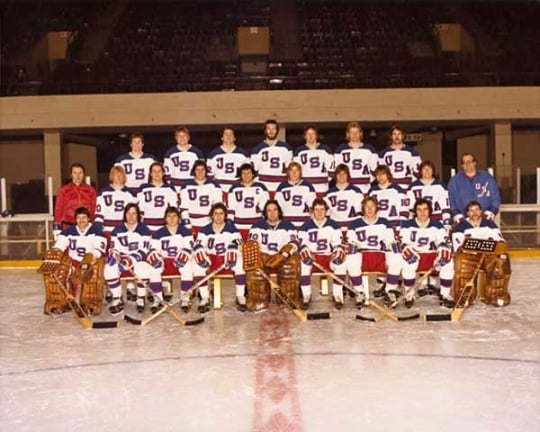
“Miracle on Ice” hockey team
The 1980 United States Olympic Hockey Team, 1980.
Holding Location
Articles
More Information
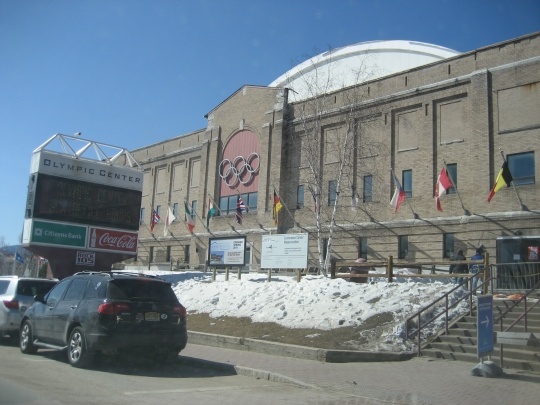
Herb Brooks Arena
Herb Brooks Arena at the Olympic Center in Lake Placid, New York, 2011. Photographby Flickr user justinknabb.
Holding Location
Articles
More Information
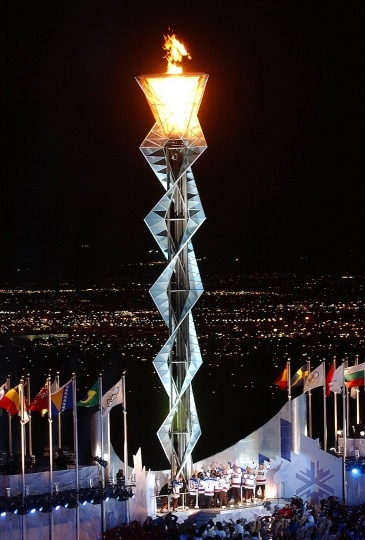
1980 Olympic U.S. Hockey team lights the cauldron at the 2002 Olympics
The 1980 Olympic U.S. Hockey team lights the cauldron at the 2002 Olympics in Salt Lake City, Utah. Photograph by Preston Keres.
Public domain
Articles
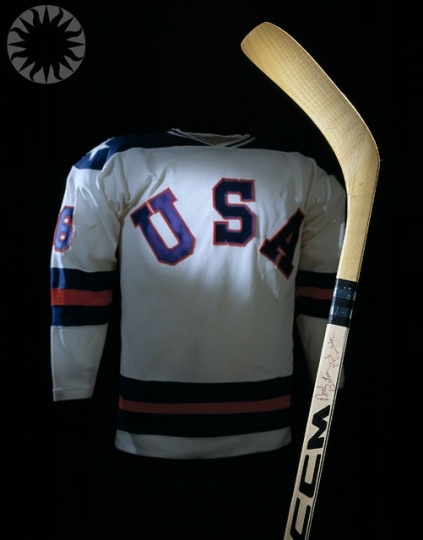
Bill Baker’s 1980 Olympic jersey
Bill Baker’s 1980 Olympic jersey and hockey stick, 2004. Baker, who was born in Grand Rapids, Minnesota, and played hockey for the University of Minnesota, was part of the "Minnesota Miracle," in which the US men's hockey team (twelve of whom were originally from Minnesota) defeated the Soviet Union in the 1980 Winter Olympics. Photograph by Flickr user public.resource.org.
Public domain
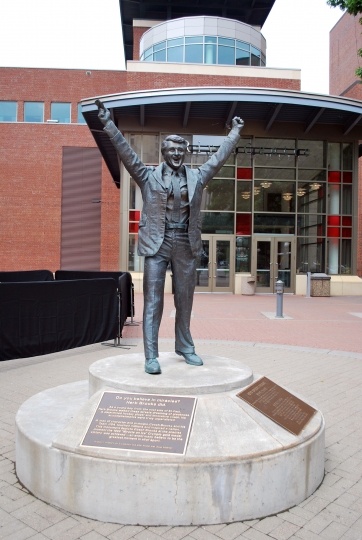
Herb Brooks statue
Herb Brooks statue at St. Paul’s River Centre. Photographed by Flickr user Bri Weldon on June 5, 2011.
Articles
More Information
Related Articles
Turning Point
On February 22, 1980, the underdog American team defeats the heavily favored Soviet Union, renewing a sense of national pride.
Chronology
Summer 1979
February 9, 1980
February 12, 1980
February 22, 1980
February 24, 1980
February 8, 2002
Bibliography
Coffey, Wayne R. The Boys of Winter: The Untold Story of a Coach, a Dream, and the 1980 U.S. Olympic Hockey Team. New York: Crown, 2005.
Gilbert, John. Herb Brooks: The Inside Story of a Hockey Mastermind. Minneapolis: MVP, 2010.
Hockey Hall of Fame. United States – 1980 Olympic Games. https://www.ushockeyhalloffame.com/page/show/831562-the-1980-u-s-olympic-team
Related Resources
Secondary
Bernstein, Ross. More…Frozen Memories: Celebrating a Century of Minnesota Hockey. Minneapolis: Nodin Press, 2007.
——— . Remembering Herbie: Celebrating the Life and Times of Hockey Legend Herb Brooks. Cambridge, MN: Adventure Publications, 2003.
Rippel, Joel A. 75 Memorable Moments in Minnesota Sports. St. Paul: Minnesota Historical Society, 2003.
Wendel, Tim. Going for the Gold: How the U.S. Won at Lake Placid. Westport, CT: Lawrence Hill & Co., 1980.
Web
International Ice Hockey Federation. “Miracle on Ice” is #1 Story.
https://www.iihf.com/en/events/2018/wm/news/1818/miracle-on-ice
Olympic.org. Lake Placid 1980.
http://www.olympic.org/lake-placid-1980-winter-olympics






